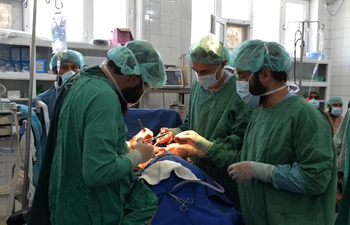BERLIN, May 7 (Xinhua) -- Germany's first electric highway (eHighway) for road freight traffic has opened in the federal state of Hesse, the German Ministry for the Environment announced on Tuesday.
On the test stretch, 5 km of overhead power lines have been installed along the right lane of the highway in both directions, according to the ministry.
The trucks driving on the eHighway test stretch are equipped with electric and diesel engines as well as batteries that could be quickly recharged via the installed overhead lines, the ministry said.
"We have traffic growth, our economy lives from transport and that is why it is important to push ahead with innovative solutions," said Rita Schwarzeluehr-Sutter, parliamentary state secretary at the ministry.
The test stretch on the German highway is part of the ELISA project (short for electrified, innovative heavy traffic on the Autobahn), and is being coordinated and operated by Hessen Mobil, the federal state's road transport authority.
The aim of ELISA is "to collect all the data that could be relevant for a later expansion in Germany," according to the German ministry.
"If we want to achieve our climate protection targets by 2030, then that actually means that we have to make progress in this sector," Schwarzeluehr-Sutter added.
By 2022, five trucking companies are planning to participate in the field test in Hesse to see whether the overhead line technology is suitable and whether it can be used to transport goods on German roads "in a climate-friendly manner," according to the ministry.
"The special feature of the Hessian test field is to integrate climate-friendly technologies into the system network of cooperative automated traffic," said Gerd Riegelhuth, president of Hesse's road transport authority.
The German environment ministry said that it had already set aside over 70 million euros (78.30 million U.S. dollars) to develop the hybrid trucks powered via overhead lines.
The construction of the test stretch in Hesse had been financed with 14.6 million euros, and a further 15.3 million euros would become available for carrying out the field test until the end of 2022, the ministry noted.
Two further test tracks are to be built in Schleswig-Holstein and Baden-Wuerttemberg.
In its most recent projection, the German government assumed that in 2030, using current measures, Germany's CO2 emissions from transport would be only about 9 percent below the 1990 level.













